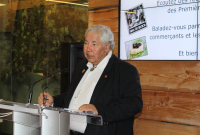Support strong Canadian climate journalism for 2025
More must be done to improve the lives of young people in First Nations communities, Justin Trudeau conceded Wednesday, even as he refused to acknowledge an outstanding human rights decision that his government has yet to honour.
The prime minister was asked why his Liberal government has yet to comply with compliance orders from the Canadian Human Rights Tribunal on the delivery of child welfare services on reserves.
No government has done more to repair the relationship with indigenous Canadians, replied Trudeau, who has indeed made a more conciliatory approach on aboriginal issues a cornerstone of his political identity.
"We need to do a better job of partnering with the provinces; we need ... to do a better job around education, we need to do a better job around child and social services," he told a news conference in Ottawa.
"No government in history has done more for repairing the relationship with indigenous Canadians and indeed investing in positive outcomes for indigenous Canadians and their communities — $8.4 billion over five years in the last budget."
The tribunal decision, first issued in January, found that the federal government was discriminating against First Nations children in its delivery of child welfare services on reserves.
The tribunal has twice issued compliance orders — including one as recently as last week — since its initial findings and after the release of the federal budget.
It is time to move past political rhetoric, said Cindy Blackstock, executive director of the First Nations Child and Family Caring Society, which helped to spearhead the original complaint.
In 2007, Blackstock's organization and the Assembly of First Nations argued that the government had failed to provide First Nations children the same level of welfare services that exist elsewhere, contrary to the Canadian Human Rights Act.
"The government needs to comply with the legal orders and end this discrimination for children — and if they do that, there will be no further need for court," Blackstock said Wednesday in an interview.
"But if they fail to do that, and the children continue to suffer, then the caring society will explore any and all legal mechanisms to ensure that discrimination stops."
While it can issue legally binding orders, the tribunal lacks any enforcement tools, which is why Blackstock's group had asked the Canadian Human Rights Commission to register the tribunal's decision with the Federal Court — a possible precursor to contempt proceedings against the government.
On Tuesday, the commission said it wants to see the dispute resolved outside the courts.
Blackstock said the government needs to provide at least $200 million this year for immediate relief on child welfare — significantly more than the $71 million the government earmarked in the spring budget.
What's more, she said, "in Budget 2016, 54 per cent of the funds announced for child welfare don't come for another four to five years."
"That is totally insufficient in terms of remedying the inequalities these poor kids are experiencing right now."
Trudeau's comments are not enough, NDP indigenous affairs critic Charlie Angus said Wednesday.
"What is it about a human rights ruling on denying children their basic rights that this prime minister doesn't get?" Angus said.
Last week, Indigenous Affairs Minister Carolyn Bennett vowed to overhaul the entire First Nations child welfare system while insisting the federal government would review the tribunal's latest compliance order.
Sen. Murray Sinclair — the former chairman of the Truth and Reconciliation Commission, which examined the legacy of Canada's residential school system — urged the government this week to comply promptly with the tribunal's findings.
In an interview Tuesday, Sinclair compared the child welfare crisis to the residential school system — a government-funded, church-operated assimilation program that existed in Canada from the 1870s to 1996.
The child welfare system is harming children by removing children from their families, he said.
"I don't think you can equate them at a legal perspective as the same thing, but in the long run, from a practical perspective, they're doing the very same thing."




Comments